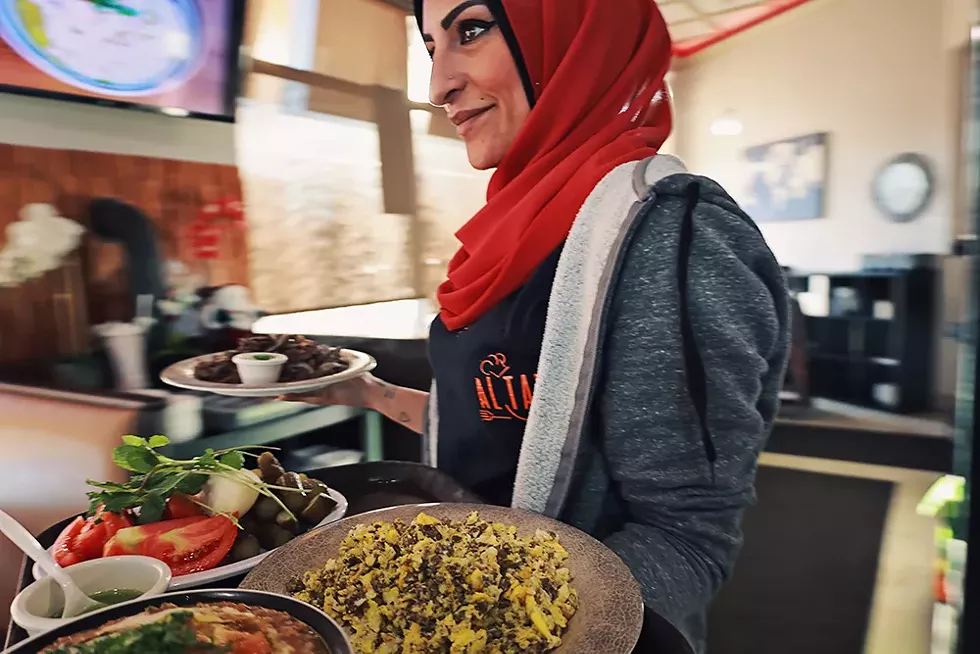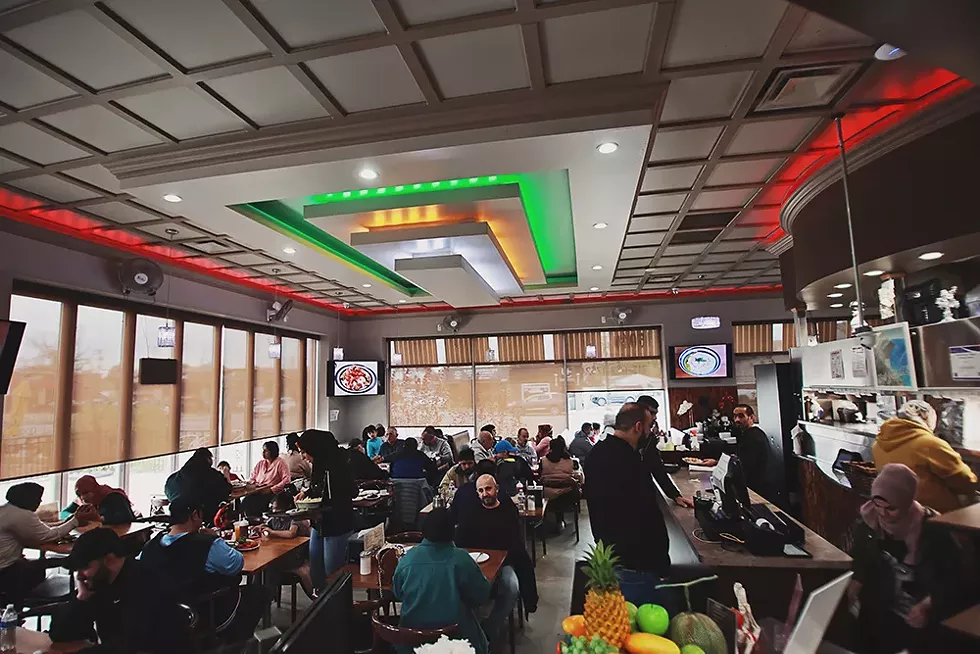Metro Detroit’s AlTayeb restaurant finds success serving up brunch, Beirut-style

Audio By Carbonatix
[
{
"name": "GPT - Leaderboard - Inline - Content",
"component": "35519556",
"insertPoint": "5th",
"startingPoint": "3",
"requiredCountToDisplay": "3",
"maxInsertions": 100,
"adList": [
{
"adPreset": "LeaderboardInline"
}
]
}
]

Mirna Hamade was skeptical. The person on the other end of the phone identified himself as a reporter for the New York Times. He had a list of questions about her family's Lebanese breakfast restaurant, AlTayeb, which has locations in Garden City and Dearborn. The Times reporter informed Mirna only that he had eaten at AlTayeb twice, and that it would be included on some type of list.
"He was asking for details and specifics about the owners," she explains. "He reached out to us for the exact spelling of names and exact dates. We did not even discuss the criteria that put our restaurant on the list."
Mirna got that phone call in October of last year. Later that month, her skepticism gave way to outright jubilation when she found out that AlTayeb had been included in the Times' list of "50 places in America we're most excited about right now" — the only restaurant in Michigan to make the cut.
"We did not imagine how big it was," Mirna admits. "Now we're seeing it."
AlTayeb is suddenly enjoying an entirely new customer base. "It was like a click of a button," Mirna says of the impact that being acknowledged by the Times has had on her family's business.
AlTayeb, which translates to "the delicious" in Arabic, is co-owned by Mirna's father, Ali Hamade, and her husband, Ahmad Sanji, who is also the head chef at both locations. Prior to opening the first AlTayeb restaurant in Garden City in 2017, Ahmad spent more than a decade running his own restaurants in Lebanon and Canada that were based around the same recipes.
Originally from Beirut, the family took separate routes before settling in the U.S. Ali and his wife, Sana, have lived in Michigan since 2005. Ahmad and Mirna arrived just a few years ago, after first immigrating to Canada through the country's skilled worker program.
AlTayeb's menu features traditional Lebanese breakfast dishes like foul (pronounced "fool"), a fava bean stew, as well as makanek sausages, pan-fried eggs, and fatteh, a dish that features fried bread topped with cooked chickpeas, yogurt, and nuts.
Despite entering a metro Detroit food scene already flush with options when it comes to Lebanese cuisine, AlTayeb's breakfast-only menu is unique to the area. "We knew that there was a big opportunity for us," Ahmad says. "No one had that concept."

The lack of such spots here is surprising given the fact that Lebanese-style breakfast is world-renowned. "The array of dishes that are brought to the Lebanese breakfast table is stunning," says Maureen Abood, author of the award-winning Lebanese cookbook Rose Water and Orange Blossoms, and a Michigan native. "It combines so many of the most recognizable flavors of Lebanese cuisine, from the za'atar spice on the man'oushe flatbreads, to the labneh spread that you have with it — the cucumbers, the mint, the eggs with all the mix-ins."
"We know how to prepare and serve this food and we are doing it the best way that it can be done," Ali says.
Chickpeas and fava beans are ordered dry and then soaked. Instead of ordering pre-made spice mixtures, they mix their spices themselves. "Everything is made in-house," Ali proudly states. "We do it from scratch."
Ahmad's seven-day work week calls for him to be inside the kitchen by no later than 6 a.m. Both locations open at 8 in the morning, and there is often a line of customers waiting to grab a table.
"It is very simple food to make, but it is very difficult for others to make it," he explains. Take for instance the fava beans for the foul, which are cooked for 20 hours before they are ready to be served.
But Ahmad says that cooking has never felt like a job to him. "I always thought of it as a passion," he says. "Plating for people, seeing people enjoy the meals that I prepared."
The son of a chef, Ahmad grew up enthralled by his father's cooking and later attended culinary school. His education continued inside the kitchens of fine dining restaurants in Beirut, where he not only cooked traditional Lebanese dishes, but Italian and French dishes as well.
AlTayeb's menu shows the influence of all three culinary styles. Borrowing from Italian cuisine, Ahmad utilizes minimal ingredients in his recipes in order to emphasize the food's natural flavors. Through his experience with French fine dining, he developed his love of presentation.
"I am always very careful in the way that I cook and plate food," Ahmad says, "because I don't want to serve something that looks nice but doesn't taste good or something that is very tasty, but the plating is not right. The taste, as well as the look, is very important to me."

Family members support AlTayeb in different ways. Ali — an experienced businessman — handles all purchases and contracts. He also runs the Garden City location, where his wife helps out in the kitchen.
Mirna, an accountant, is in charge of the restaurant's finances. The most technologically savvy of the bunch, she runs AlTayeb's phone and online ordering systems, and also monitors their social media presence.
"There's big trust between the three of us," Mirna explains. "The trust is that whatever decision is being made is the right decision at the right time."
Despite their busy schedules, the family still makes time every evening to cook and enjoy dinner together. Mirna described the custom as a way for them to collectively relax and reenergize while reflecting on the day's events. "It helps give us that push for the next day," she says.
For Ahmad and Mirna, their decision to immigrate to the U.S. was rooted in their desire for a better future, not just for themselves, but for their children as well.
When Mirna's parents moved to Michigan in 2005, they brought her three younger brothers with them. Since she was already an adult, Mirna, at the age of 25, was too old to join the rest of her family.
"It was a very hard time for me to be on my own in Lebanon in an unstable country while my whole family is here," Mirna states. "It was not an easy wait."
In June of 2014, Mirna, Ahmad, and their infant son, Malek, moved to Canada, settling near Windsor. Their close proximity to the U.S.-Canada border meant that their family in Michigan could easily come to visit. Their second son, Elan, was born the following year.
In Canada, Ahmad quickly opened one restaurant, and then another. The couple had faith that it would only be a matter of time before Mirna's U.S. visa was finally approved.
Once they were able to move to Michigan, Mirna encouraged her husband to view their stay in the U.S. as permanent, not temporary. "I think it had a lot to do with seeing the opportunities in this country," she explains. "Seeing what you can achieve."
Mirna credits her father with convincing Ahmad that there were opportunities for him in the U.S. restaurant business. "They have great trust between each other," she explains. "My dad kept feeding him those stories about other people, telling him those success stories about immigrants."
She adds, "Ahmad could have gone to any restaurant and became an executive chef. But that was not an option for us, because he is best at running his own restaurant."
For those who grew up in the Middle East, the food served at AlTayeb often evokes memories of gathering to enjoy Sunday mornings with their families.
tweet this
The first AlTayeb opened in Garden City in 2017. A modest restaurant of only 900 square feet, they ran it as a sub shop during the week, and served breakfast on weekends. It was an experiment to see if the breakfast menu would catch on.
Within three months, customers were asking for breakfast every day. Sandwiches were dropped from the menu, and AlTayeb became a full-time breakfast restaurant.
"We were blown away by the support," Ali says. "We did not expect how popular we would become in no time."
For Ahmad, the switch to breakfast was a welcomed development. "I don't like to serve sandwiches. I prefer to serve something on a plate," he says. "I enjoy presenting food in a way that makes it look as if it's a piece of art."
"I like to see people take photos; before they start, before they touch anything," Ahmad says with a smile. "When I see this from the kitchen, I am proud of myself and all of the people around me. It gives me confidence that people are seeing my vision — that food should not only taste good, but should also look as appealing as it tastes."
For those who grew up in the Middle East, the food served at AlTayeb often evokes memories of gathering to enjoy Sunday mornings with their families.
Sunday morning breakfast in the Lebanese tradition is an hours-long, intergenerational affair marked by the continuous introduction of new dishes to the feast. "It's a people connector," says Abood. "It brings us together. It makes us want to stay and linger and do something that we don't normally do in the morning."
"Lebanese food is probably the richest pathway to Lebanese people connecting with their memories, their family history, and, ultimately, their joy...It keeps us coming back, and we want more of it because it connects us with who we are," Abood says.
Maintaining cultural connections is important to the owners of AlTayeb. "People are coming here not just for the food, but for the experience," Ahmad says. "For us, it's so important," Mirna adds. "It's very hard to try and keep that memory for people so that they can come in to eat the food and relive that experience again. You do not want to ruin it for them."
In early 2020, the family embarked on what they considered a logical next step by opening their Dearborn restaurant, which features an outside patio during Michigan's summer months. The new location allowed them to double their seating capacity and put them closer to metro Detroit's diverse Arab population.

But five weeks after opening in Dearborn, Michigan's COVID-19 shutdown went into effect. It ushered in a series of false starts for both restaurants as the family adjusted to gradual capacity level increases, customer contact tracing, and worker shortages. While the pandemic has had a devastating impact on many local restaurants, AlTayeb's business is growing. The family credits their survival in large part to the fact that customer support never wavered.
"The demand was still there," Ali explains.
Hassan Osseili, a native of Lebanon who lives in Canton, has been eating at AlTayeb since it first opened. "I've almost tried everything on the menu," he says. "Everything's made from scratch. That's why I like it. That's why a lot of people like it."
Since landing on the Times' restaurants list, AlTayeb has seen a sharp increase in new customers, including many who are unfamiliar with Lebanese food.
"We've asked the servers to tell them how to eat it," Ali says.
But with the waitstaff already overworked, AlTayeb plans to implement a QR code system that will aid customers by showing them photos of menu items. The restaurant has also upgraded their phone system in order to keep up with the sudden increase in dine-in wait times and carryout orders.
Anthony Watson came with a friend recently to eat at AlTayeb for the first time.
"I'm from Dearborn. I grew up on this stuff. [But] this is so different," Watson says. "We actually asked the waitress to just tell us what we want."
Reflecting on AlTayeb's increased popularity, Mirna is quick to point to the strength of Ali and Ahmad's original dream to open a breakfast-only restaurant using simple, quality ingredients.
"Believe it or not, the talk they always had back home was that we are going to make it and we are going to get to the point where everyone is going to be talking about us," she explains.
"What's really overwhelming is that it happened that quick."
AlTayeb has locations at 15010 W. Warren Ave., Dearborn; 313-908-9527 and 873 Inkster Rd., Garden City; 734-237-4606; altayebrestaurant.com.
This story was made possible through a partnership with the Race and Justice Reporting Initiative and the Detroit Equity Action Lab at the Damon J. Keith Center for Civil Rights.
Stay connected with Detroit Metro Times. Subscribe to our newsletters, and follow us on Google News, Apple News, Twitter, Facebook, Instagram, or Reddit.






